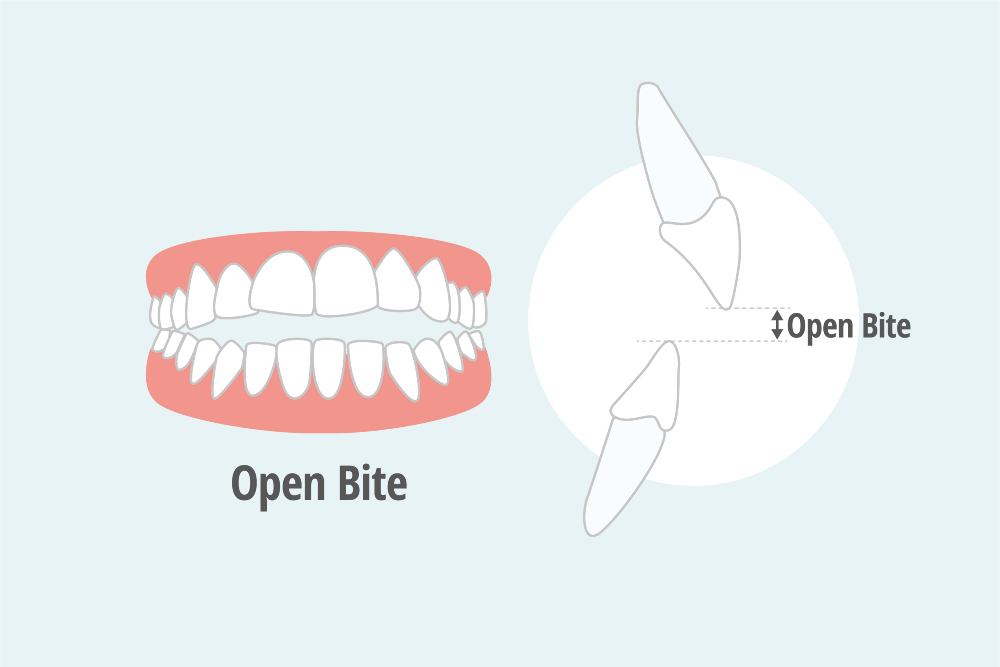What Is An Open Bite?
An open bite is a type of malocclusion where the teeth in the upper and lower jaws do not touch when the mouth is closed. This can happen if the teeth are missing, or if they are misaligned. An open bite can also be caused by habits like thumb sucking. Open bites can make it difficult to eat and speak properly. They can also cause gum problems and tooth wear. Treatment for an open bite will vary depending on the severity and cause of the condition but may include braces or surgery.
Types Of Open Bite
-
Dental Open Bite
Some teeth can cause problems when they erupt, which can lead to the molars developing irregularly. This can cause the upper and lower teeth not to come together properly when the mouth is closed. A dental open bite means that the gum and jaws are in the way of positioning the teeth that need to erupt.
-
Anterior Open Bite
If your upper and lower teeth don’t overlap, you may have an anterior open bite. This means that your front teeth don’t line up properly, causing an incomplete bite. Orthodontic treatment can help resolve an anterior open bite.
-
Skeletal Open Bite
A skeletal open bite is a misalignment of the upper and lower jaws, which causes defects in facial growth and development. In patients with a skeletal open bite, the molars do not line up properly, often leading to a long-face syndrome. This condition is also accompanied by other symptoms such as pressure on the mentalis muscle from trying to close the mouth and the possibility of a gummy smile with an increased interlabial gap.
-
Posterior Open Bite
Two types of open bite defects can posteriorly affect patients – one where the upper and lower front teeth fail to touch, and another where these front teeth do touch. In either case, this forces the patient to bite down hard, which then prevents the back teeth from coming together. However, treatment options are available that strengthen the molars and premolars, and eventually allow the patient to chew properly again.
What Causes Open Bite
-
Genetics
Genetics are a big part of the open bite. Children who have a parent or grandparent who has a dental problem will be at risk of developing the same problem.
If you and your child have not been aware of any family history, it is still possible that genetics are involved. Genetics are passed down from parents to children in an unbroken line. This means that if one parent has a disease or condition, then there is a chance that his or her children will also inherit it.
You may want to talk with your dentist about genetic testing if you think this might be the case. Many dentists offer genetic testing as part of their standard practice, but it can be done on an individual basis as well.
-
Bad Oral Habits
Open bites are one of the most common dental problems, and they can be caused by a number of different things. One of the most common causes of open bites is bad oral habits. Things like thumb sucking, tongue thrusting, and even pacifier use can cause the teeth to shift and result in an open bite.
If you suspect that your open bite is due to bad oral habits, the best thing to do is to seek professional help. A dentist or orthodontist can help determine if that is indeed the case and then create a treatment plan to correct the problem.
-
Poor Dental Care
When you fail to take care of your teeth, you open yourself up to a variety of dental problems, such as cavities and gum disease. If your gums are not strong enough, your upper and lower teeth will not connect as they should. If you notice a gap on the front or back of your mouth, you must contact your orthodontist to treat cavities and unhealthy gums that could result in an open bite.
-
Missing or Extra Teeth
A missing tooth can make the jaw smaller, making it more difficult for the teeth to align properly. Missing and extra teeth are also more likely to be misaligned with other teeth because there is less bone behind them to support them. If you have missing or extra teeth, they may be causing your bite problems. Your dentist can check for these problems and help you decide if they are causing your open bite.
What Are the Signs of an Open Bite?
While the inability to entirely close your mouth is one of the major signs of an overbite, there are a few other things you should look out for. Some signs that may suggest that you have an open bite are listed below:
- Problems with chewing or swallowing that may cause trouble eating food
- Incorrect teeth alignment
- Problems with the speech, such as a lisp
- Pain while eating food
- Inability to make contact with upper and lower time
- Unattractive smile
How to Fix An Open Bite?
An open bite is a type of dental malocclusion that occurs when the upper and lower teeth do not touch when the mouth is closed. This can be due to a variety of factors, including genetics, improper dental development, or habitual thumb-sucking. Treatment for an open bite will vary depending on the severity and cause of the condition, but may include braces, Invisalign clear aligners, or oral surgery.
Final Thoughts
If you are interested in learning more about an open bite and how it can be treated, please get in touch with our practice for a free first consultation. As you can see from this blog, there are a number of different treatment options for this condition. One may be a better option for you than the others. At Thurman Orthodontics, our goal is to provide you with the best oral health care available. So please get in touch with us at 559-439-0425. We look forward to meeting you and helping you with your problems!

Dr. Brian Thurman has spent his entire life enjoying all the beauty that California has to offer. A Fresno native, he still escapes to the ocean or the mountains whenever his busy schedule allows. Driven by his love for natural beauty, Dr. Thurman enjoys creating beautiful smiles and healthy bites that last a lifetime. He is proud to be the only Ivy League trained Orthodontist in the Fresno/Clovis area.

